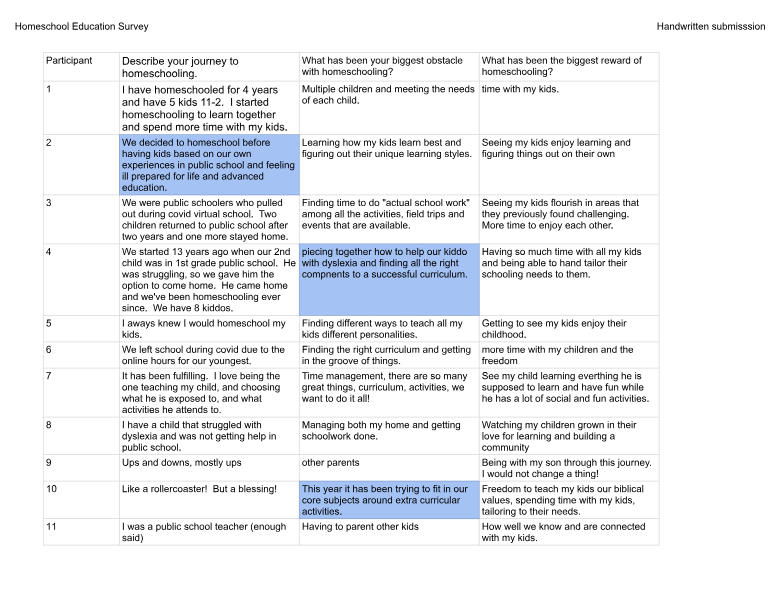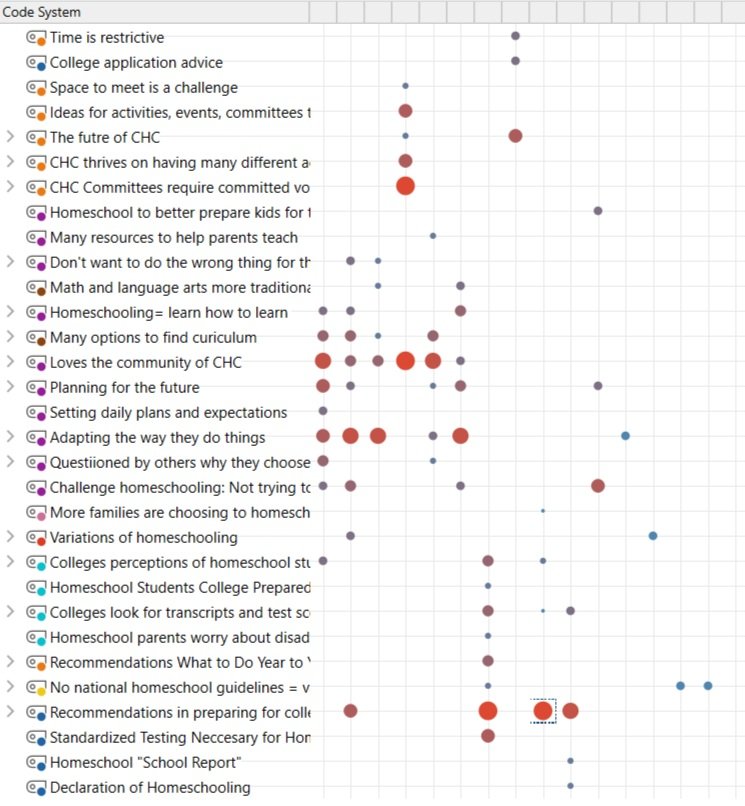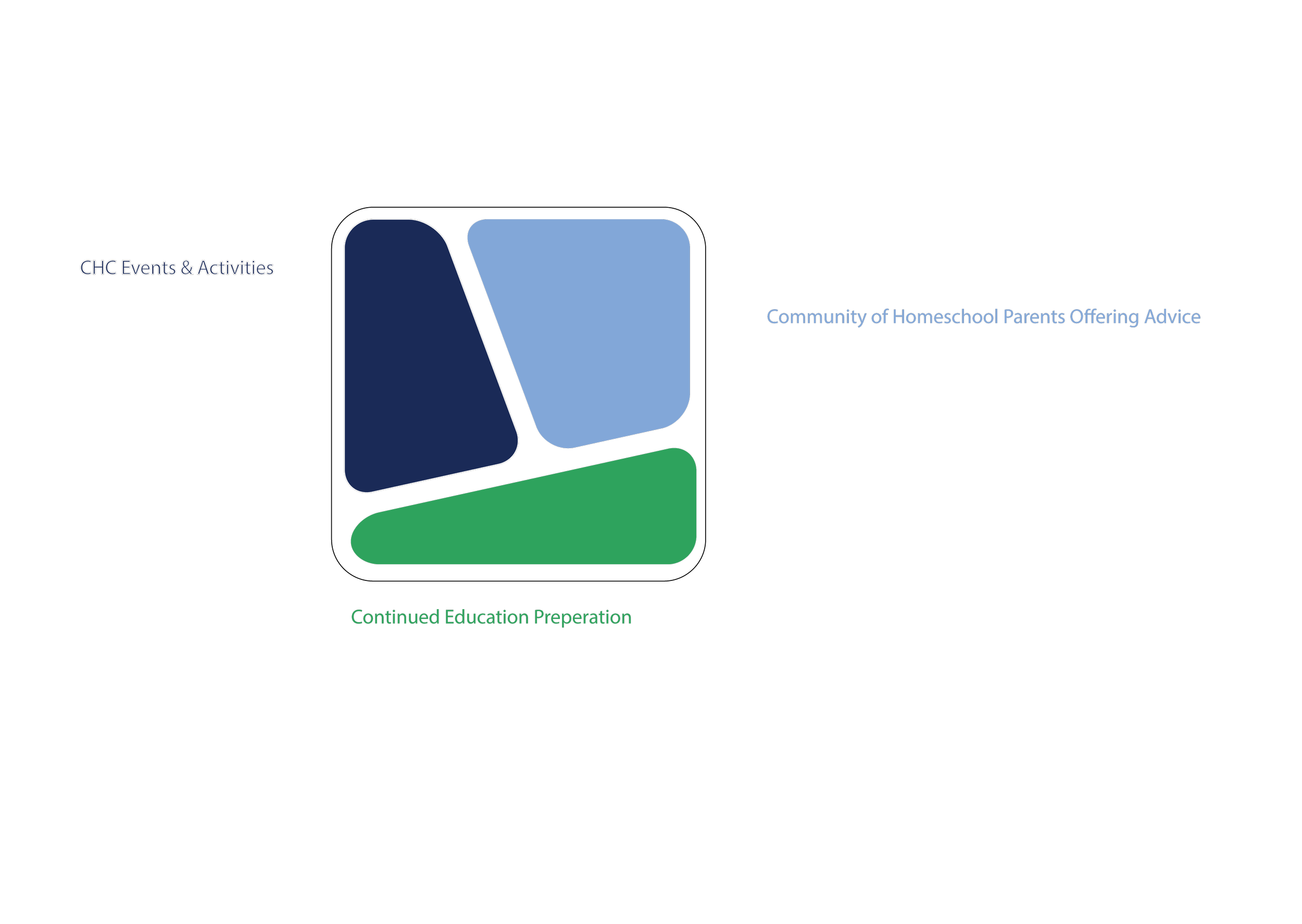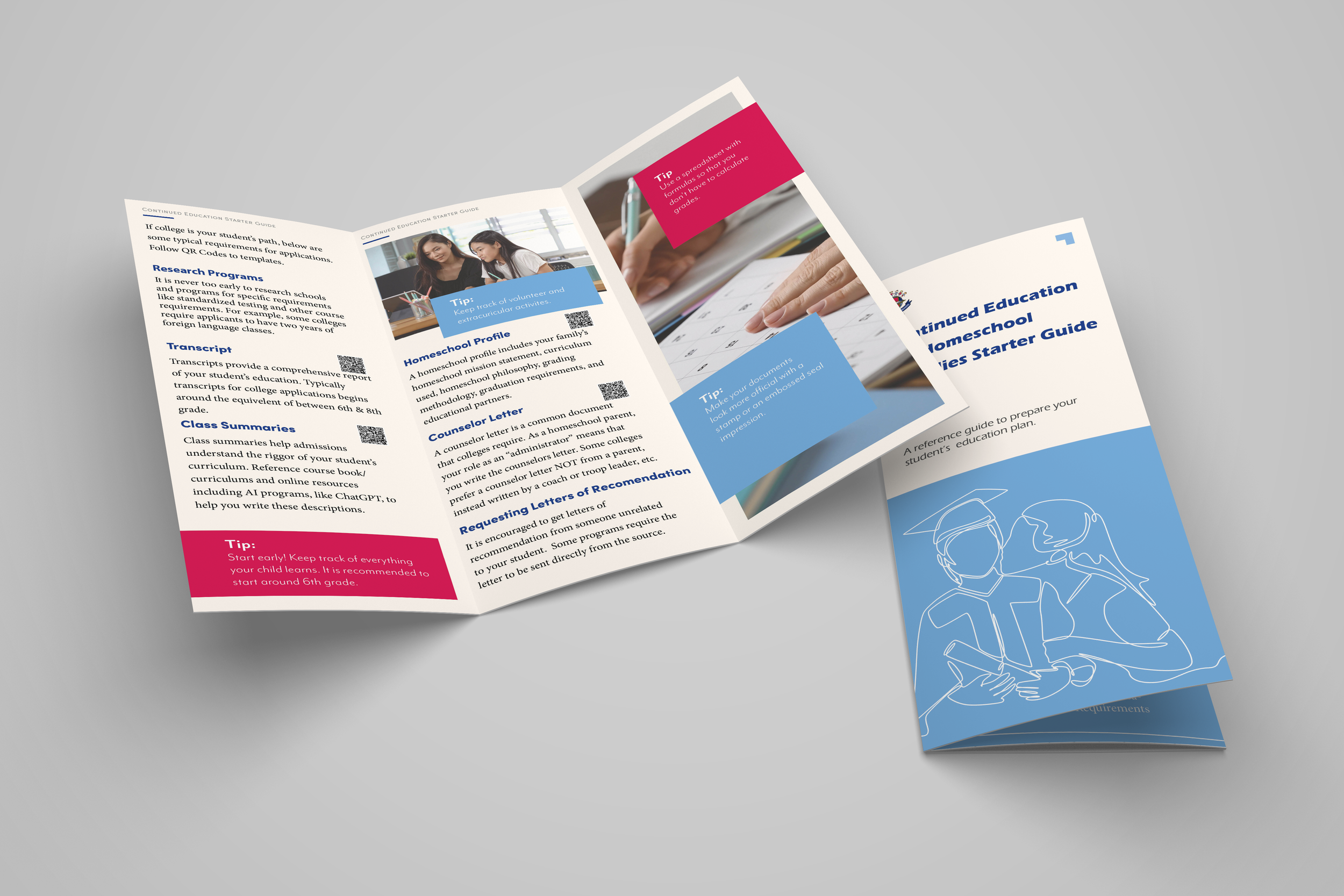
Bridging Paths for Cypress Homeschool Council
Project Duration 10 Weeks.
Methods used: Qualitative interviews, co-creation sessions, prototype testing.
Tools used: MaxQDA, Adobe Suite, Miro.
A Systematic Approach to New Support Initiatives for Cypress Homeschool Council (CHC) With An Emphasis on Enhancing Support and Engagement + Empowering Homeschool Families in Their Pursuit of Continued Education.
The Cypress Homeschool Council is a nonprofit organization of homeschool families in the Cypress/ northwest Houston, Texas, area that is looking to improve how they implement new events and activities, including an endeavor to support and ease the process for homeschool families to create and track the records and documents that continuing education organizations require of homeschool students.
In this 10-week project, my intention as a service designer was to investigate and design a systematic solution to help Cypress Homeschool Council (CHC) grow in their support and activity offerings to meet the member homeschool families' needs.
This project addresses and provides an overview of how CHC can facilitate the implementation of new events and initiate a support committee that guides parents in preparing their students for continued education.
It is important to note and respect that every homeschooler's journey is different. For the purpose of this project, continued education is a generalized term that covers college and other alternative learning programs that may also have application requirements.
Guidance from Professor Ricardo Martins
Their role in the organization fluctuates depending on the events. The Smiths have been a part of CHC since it started in 2019. Jill, the mom, is the primary homeschooling parent.
Parent:
Jill brings her two kids to a field trip organized by other volunteers.
Committee leader:
Jill is a committee leader for the student council meetings.
Volunteer:
Jill volunteers and assists other volunteers in the STEM program.
Context
A core principle of CHC is its requirement for every member family to participate in at least one event or committee each month. This approach fosters a diverse array of activities and events, enabling CHC to offer a wide range of options for its members. Consequently, the nature of members' relationship as stakeholders within CHC undergoes constant shifts, varying depending on the context. Some may enthusiastically volunteer and become deeply invested in a particular activity, while others may only show up to participate.
One noteworthy aspect of CHC is the blurred line between frontstage and backstage relationships, exemplifying the value of community within the organization. Members seamlessly transition between active participation and supporting roles.
Presently, the organization is faced with the challenge of expanding its services further. This includes introducing a continued education initiative and establishing a robust support system to assist homeschooling parents. Addressing these areas will reinforce CHC's commitment to its members' diverse needs and aspirations.
Problem
Volunteer buy-in to lead new events or committees.
The desire for a new committee, event, information, and advice channel on the subject of continued education.
Process
1. Research
A proprietary questionnaire was used to understand what motivated members to homeschool and join CHC, their biggest obstacle, and their biggest reward. These insights provided a foundation for secondary research and the development of the interview questions. I undertook 14 interviews, including interviews with the co-founder of CHC, who is also the Co-president and the Director, 6 parent members of Cypress Homeschool Council, and 7 others with people with experience in education. Secondary research was integral throughout the process in understanding the law and the breadth of differences and options in curriculum and education plans. This helped reinforce the idea that it is hard to figure out how to track an individual education path because there is no path that is the same.
To manage the collected data and insights effectively, I utilized Google Sheets, Miro, and MaxQDA. These platforms facilitated the organization and analysis of the research findings.
CHC has curated a positive community of parents and homeschoolers from diverse backgrounds; however, they have struggled to enact new ideas and initiatives. A common behavior is for someone to suggest a new event or initiative, but they do not want to step up and lead; they would rather just participate.
2. Insights and data
There is an interesting balancing act between the flexible homeschooling lifestyle and the structure that continued education requires.
To reiterate, the two main pain points relate to the following:
Starting new initiatives with volunteers stepping up. The success of CHC relies on volunteers facilitating ideas to offer opportunities for the children of CHC.
There is a gap in helping parents track and prepare for continued education.
Zooming in, the core of this project centers around pulling from the positive attributes of the community CHC can gather through events and activities they curate, the encouraging community of homeschool parents, and the desire for more direction in pursuing continued education for homeschoolers.
-
Cypress Homeschool Council is a group of parents and caretakers on a homeschooling journey with their children. The members value community and friendships.
CHC has established a community of currently 80 member families. CHC’s membership has ebbed and flowed despite this strong community of members. As the organization adapts to a changing dynamic, it can take steps to meet the needs of its current members. CHC has a variety of events and activities that cover every K-12 age group and reinforces community and friendship, as well as learning and exploration for both the homeschooled students and the parents.
-
Each state's educational requirements, documentation, and record-keeping of homeschooled families in the U.S. differ. In the state of Texas, homeschools are considered private schools; certain subjects- math, reading, spelling, grammar, and a course on good citizenship are required, and they must use a written curriculum. However, the state does not require notifications or assessments, meaning parents do not need to keep any education records for the state. With no documentation required by the state of Texas, parents are often overwhelmed when they realize that they do need to be keeping some record of their student's education plan if they want to pursue a continued education program.
-
Many colleges and even other continued education programs require homeschoolers to provide documentation and records. Some standard documents include transcripts, class summaries/descriptions, homeschool profiles, the equivalent of a counselor's letter, etc.
3. Creating solutions
Analysis of the insights led to the questions:
How might we streamline and help CHC go from ideas to action?
How might we address the fear and desire for more guidance on preparing homeschooled parents and students for continued education?
The next step was testing the hypothesis that the CHC community would like the continued education preparation event to manifest as a panel of parents with different experiences in preparing their children for their individual continued education journeys. This hypothesis was tested by showing CHC members an agenda of the panel event and a prototype of the handout brochure with general information about common documents, including transcripts, class descriptions, homeschool profiles, etc.
Co-creation through repeated communication between two stakeholders and sharing of ideas via phone calls and video chats.
Proposed Solution
New CHC Event / Committee Checklist and Guideline -
Bridging paths between new ideas and action
An action plan and receive communication channel that helps volunteers who are hesitant to take action with confidence.
Proposed Solution Zooming In
Continued Education Initiative -
Bridging paths of Information and community help
Parents seek to manage and balance the flexible lifestyle homeschool families are accustomed to and the structure necessary to prepare and track their student's educational journey.
The Panel event combines the organization and collective of people involved in CHC events with the strength of the homeschool community, providing advice and feedback to one another to meet the need of many CHC members who desire more information and direction in preparing for their child(ren)’s future education. Includes an action plan for preparing for the event.
Prototyped Brochure
The Continued Education Starter Guide is a brochure that can be handed out at the panel event to direct participants to the continued education resources. The intention is to provide easy access to free resources, reference information, and people.
The Templates and Checklist are provided through Google Drive, a new channel CHC has not incorporated. The checklist is a generalized condensed checklist that serves as a jumping-off point for parents to get started. Many voiced feeling overwhelmed with wanting to do right by their child but feeling lost in what to do.
An additional element is creating a communication and shared information channel for this particular topic. It was revealed during interviews that there is a lot of communication between CHC members through the Spaces app and CHC website in different forums, but there is an opportunity to enhance support and engagement within the CHC community.
Impact
When implemented, these initiatives could help CHC more holistically meet the needs of its 80 member families, expand the organization's reach, and serve as a model for future endeavors as the organization grows and shifts. It can also serve as a model for other homeschool organizations that are looking to be more active.
Benefits
Benefits of New CHC Event Initiatives
Allow CHC to grow constructively. While also empowering the volunteers who are not as comfortable leading. This could help CHC explore new opportunities to meet the needs of members.
Benefits Continued Education Initiative
This service, through the CHC community, can be beneficial to many of the members. It is adaptable, reflective of” no education journey is the same,” and that continued education is a broad umbrella. Traditionally, this service does not always mean “college”; it could be a homeschooler preparing to enter a particular trade requiring a certain level of high school credits or other prerequisites.
This service can also benefit homeschool families who move outside of Texas to another state requiring more documentation and record keeping for homeschooling.

Key Takeaways
The scope of a project is subject to change as you gain insights from various stakeholders involved.
Even small adjustments, driven by a deep understanding of the system, can lead to significant impacts.













